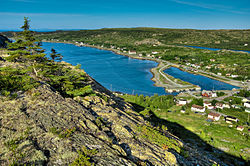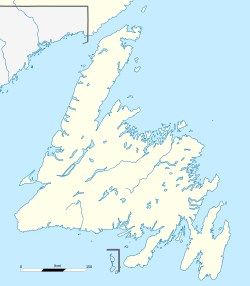Cupids
Cupids | |
|---|---|
Town | |
 | |
Location of Cupids in Newfoundland | |
| Coordinates: 47°32′52″N 53°13′28″W / 47.5478°N 53.2244°W | |
| Country | |
| Province | |
| Settled | 1610 |
| Government | |
| • Mayor | Carl Butler |
| Population (2016) | |
| • Total | 743 |
| Time zone | UTC-3:30 (Newfoundland Time) |
| • Summer (DST) | UTC-2:30 (Newfoundland Daylight) |
| Area code | 709 |
Cupids is a town of 743 on Conception Bay, Newfoundland and Labrador, Canada. It has also been known as Coopers, Copers Cove, Cupers Cove, and Cuperts. It is the oldest continuously settled official British colony in Canada. Cupids is believed to be the site of the first child born of European parents on the continent.[1] The town was established by Englishman John Guy in 1610.[1]
In November 2009, the community was visited by The Prince of Wales and The Duchess of Cornwall. In August 2010, the community was visited by many people from around the world to celebrate the Cupids 400th anniversary, including Canadian Governor General Michaëlle Jean. On August 17, 2010, Canada Post released a commemorative stamp in honour of the founding of the community.[2]
2010 also saw the opening of the Cupids Legacy Centre. This facility includes a world class museum, archeology lab, Faerie Garden, Family History archive, Legacy Hall (a modern 2000 square foot open space), and a spacious boardroom.
Arts and Culture
Cupids is home to Perchance Theatre.[3]
See also
References
- ^ a b "Cupids, Canada's Oldest British Colony". Archived from the original on 2009-09-03. Retrieved 2010-06-29.
{{cite web}}: Unknown parameter|deadurl=ignored (|url-status=suggested) (help) - ^ Canada Post, Details/en détail, vol. 19, no. 3 (July to September 2010), p. 17.
- ^ "Perchance Theatre - Cupids". Newfoundland and Labrador, Canada – Official Tourism Website. Retrieved 2018-03-23.
External links
 Media related to Cupids, Newfoundland and Labrador at Wikimedia Commons
Media related to Cupids, Newfoundland and Labrador at Wikimedia Commons- History of the Cupids colony and John Guy
- Cupids - Encyclopedia of Newfoundland and Labrador, vol.1, p. 572-573.



